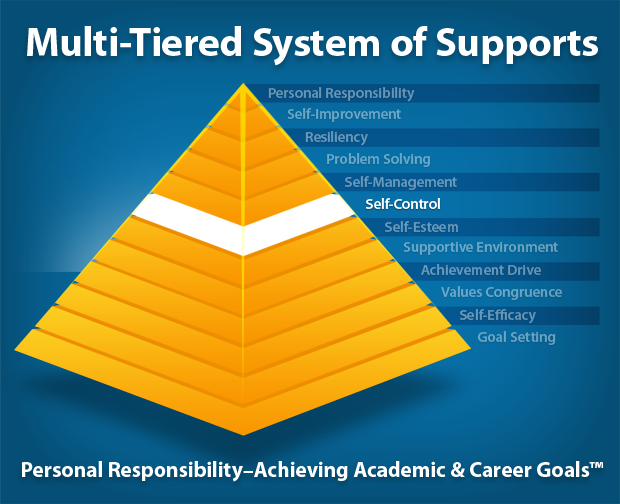
The focus of this blog is on the all-important social/emotional learning skill of self-control, which is the seventh scale of twelve in the Personal Responsibility Map®, a core assessment in our Personal Responsibility—Achieving Academic and Career Goals program.
Self-control is the ability to handle personal feelings and emotions in difficult life situations.
MTSS and Self-Control
Multi-Tiered System of Supports, or MTSS, is a term used to describe an evidence-based model of schooling that uses data-based problem solving to integrated academic and behavioral instruction and intervention (Florida’s MTSS Project). This definition brings together the worlds of academic instruction and behavioral intervention.
In the MTSS model of supports, self-control is a pillar upon which other social/emotional skills related to student retention and academic success are built. With an individual developing the skills of self-control, other important social/emotional skills related to academic retention and success can be developed such as drive strength/motivation, commitment ethic, and time management. (See Success Profiler®—Personal Skills Map®)
The Cognitive Brain vs. The Emotional Brain
The cognitive brain (dealing with thoughts) and emotional brain (dealing with feelings) proved a steady flow in information. When a life-threatening situation happens, the emotional brain takes over. The stronger the feeling, the stronger the emotional brain becomes and the weaker the cognitive brain becomes.
When someone experiences a feeling such as anger, a battle between the cognitive and emotional brains begins.
Many researchers feel that the amygdala is the center of the brain. It controls emotions and can quickly decide on an emotional way of acting in a situation. The amygdala seems to work as a storehouse of emotions and feelings.
Daniel Goleman, in his book Emotional Intelligence, writes about the inability of the amygdala to correctly handle emotional situations. When the amygdala fails, he calls this an “emotional hijacking”. During and emotional hijacking, incorrect actions are the direct result of people’s inability to use the cognitive brain along with the emotional brain. The emotional brain simply takes over.
We see the results of this emotional hijacking in our schools every day, in actions such as student violence, bullying, poor grades and students dropping out of school.
Want to learn more about helping your students to learn to control emotional hijackings and to learn to understand their emotions and how to control their behavior? Sign up below to sign up for our free trial and explore our Personal Responsibility program.

